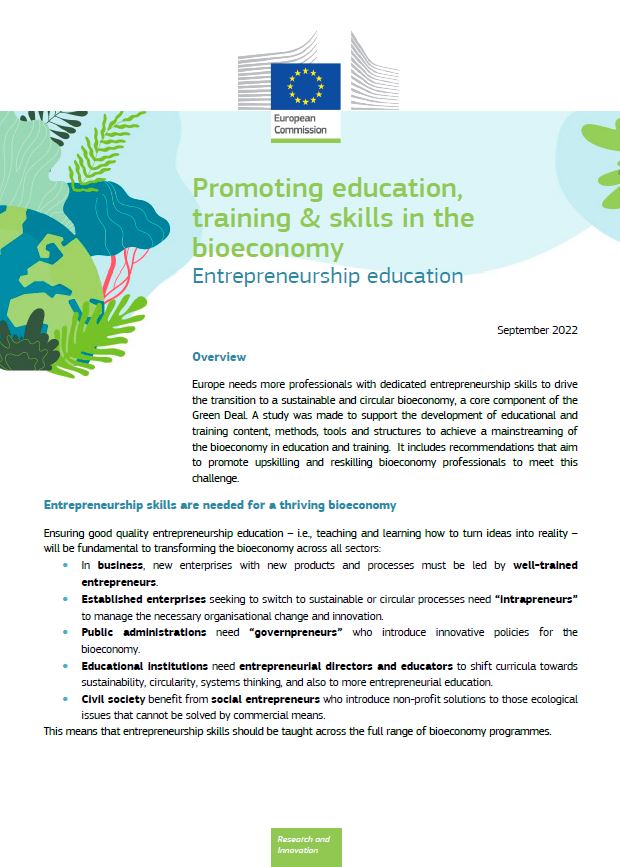On Thursday 15 September 2022 from 9.00 to 17:00 CET, Deloitte, empirica and Fondazione Giacomo Brodolini (FGB) organised a Conference, together with the European Commission’s Directorate General for Research & Innovation (DG RTD), as part of the project on “Promoting education, training and skills across the bioeconomy”.
During the conference the results of the project and the recommendations for the development of education at higher education, VET and entrepreneurship levels, were presented and discussed in order to empower the future workforce with the skills required in an evolving, circular and sustainable bioeconomy.
The results are now publicly available and you can download all the material at the following links:
 Policy brief
Policy brief
The bioeconomy, as a catalyst for systemic change, tackles the economic, social and environmental aspects of the European Green Deal, seeking new ways of producing and consuming resources while respecting our planet’s limits and moving away from a linear economy based on extensive use of fossil and mineral resources. As defined in the European Commission’s updated Bioeconomy Strategy of 2018, the bioeconomy covers “all sectors and systems that rely on biological resources (animals, plants, micro-organisms and derived biomass, including organic waste), their functions and principles. It includes and interlinks land and marine ecosystems and the services they provide; all primary production sectors that use and produce biological resources; and all economic and industrial sectors that use biological resources and processes to produce food, feed, bio-based products, energy and services.” The transition to a sustainable and circular bioeconomy will be achieved through the five goals of the EU Bioeconomy Strategy: Ensuring food and nutrition security; Managing natural resources sustainably; Reducing dependence on non-renewable, unsustainable resources; Limiting and adapting to climate change; Strengthening European competitiveness and create jobs. This transition presents opportunities for jobs and economic growth. In particular, the Bioeconomy Strategy forecasts that one million new jobs could be created by 2030, supported by the “strong and fast-growing start-up ecosystem in the biotechnology sector”.
 Final report
Final report
This is the Final Report of the study on “Promoting education, training and skills across the bioeconomy” conducted by Deloitte, Empirica and Fondazione Giacomo Brodolini Srl SB (FGB), mandated by the European Commission’s DG Research & innovation (DG RTD). The study assesses the current and future (2030 and 2050) needs for professional profiles and skills, bringing together a quantitative forecast exercise and a qualitative ‘foresight’ activity, which incorporates expert insights on the future of the bioeconomy. This assessment is compared against the current education and training provision in the bioeconomy at three levels: higher education, vocational education and training, and entrepreneurship training. This comparison highlights key unmet training needs that need to be addressed to realise the opportunities that the bioeconomy can provide in the future. Recommendations are provided for each of the education levels to address these skills needs, including model curricula which draw on case studies of good practices. These recommendations cover both the content of model curricula, as well as approaches to developing and updating programmes to meet the changing needs of the bioeconomy.
Factsheets:
 Higher education
Higher education
Europe needs more professionals with dedicated skills to drive the transition to a sustainable and circular bioeconomy, a core component of the Green Deal. A study was made to support the development of educational and training content, methods, tools and structures to achieve a mainstreaming of the bioeconomy in education and training. The following recommendations aim to promote upskilling and reskilling bioeconomy professionals to meet this challenge.
 Vocational education and training
Vocational education and training
Europe needs more people with the skills needed to drive the transition to a sustainable and circular bioeconomy, a core component of the Green Deal. A study was undertaken to support the development of educational and training content, methods, tools and structures to achieve a mainstreaming of the bioeconomy in education and training. It includes recommendations to train people to work in the bioeconomy.
 Entrepreneurship education
Entrepreneurship education
Europe needs more professionals with dedicated entrepreneurship skills to drive the transition to a sustainable and circular bioeconomy, a core component of the Green Deal. A study was made to support the development of educational and training content, methods, tools and structures to achieve a mainstreaming of the bioeconomy in education and training. It includes recommendations that aim to promote upskilling and reskilling bioeconomy professionals to meet this challenge.
